
Wuppertal is a city in North Rhine-Westphalia, Germany, in and around the Wupper valley, east of Düsseldorf and south of the Ruhr. With a population of approximately 350,000, it is the largest city in the Bergisches Land. Wuppertal is known for its steep slopes, its woods and parks, and its suspension railway, the Wuppertal Schwebebahn. It is the greenest city in Germany, with two-thirds green space of the total municipal area. From any part of the city, it is only a ten-minute walk to one of the public parks or woodland paths.

Elberfeld is a municipal subdivision of the German city of Wuppertal; it was an independent town until 1929.

The Barmen Declaration or the Theological Declaration of Barmen 1934 was a document adopted by Christians in Nazi Germany who opposed the Deutsche Christen. In the view of the delegates to the Synod that met in the city of Wuppertal-Barmen in May, 1934, the German Christians had corrupted church government by making it subservient to the state and had introduced Nazi ideology into the German Protestant churches that contradicted the Christian gospel.
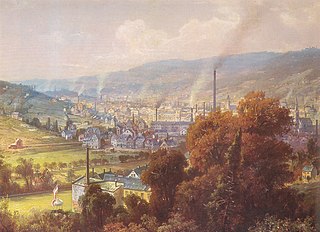
Barmen is a former industrial metropolis of the region of Bergisches Land, Germany, which merged with four other towns in 1929 to form the city of Wuppertal. Barmen, together with the neighbouring town of Elberfeld founded the first electric suspended monorail tramway system, the Schwebebahn floating tram. Barmen was a pioneering centre for both the early industrial revolution on the European mainland, and for the socialist movement and its theory. It was the location of one of the first concentration camps in Nazi Germany, KZ Wuppertal-Barmen, later better known as Kemna concentration camp.

Vorwerk is an international diversified corporate group headquartered in Wuppertal, Germany. The main business is the direct distribution of various products like household appliances, fitted kitchens and cosmetics. Vorwerk was founded in 1883.

SSV Barmen was a German association football club from Barmen in the city of Wuppertal, North Rhine-Westphalia. The club became part of ASV Wuppertal in a 1970 merger with VfB Wuppertal, Eintracht Wuppertal, and Viktoria Wuppertal.

Johann Viktor Bredt was a German jurist and politician. He served as Minister of Justice of the Weimar Republic in 1930/1.
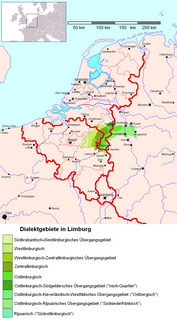
Bergish is a collective name for a group of West Germanic dialects spoken in the Bergisches Land region east of the Rhine in western Germany. The name is commonly used among its speakers, but is not of much linguistic relevance, because the varieties belong to several quite distinct groups inside the continental West Germanic dialect continuum. As usual inside a dialect continuum, neighbouring varieties have a high degree mutual intelligibility and share many similarities while the two more distant ones may be completely mutually unintelligible and considerably different. Therefore, speakers usually perceive the differences in their immediate neighbourhood as merely dialectal oddities of an otherwise larger, solid group or language that they are all part of, such as "Bergish". Bergish is itself commonly classified as a form of "Rhinelandic", which in turn is part of German. Bergish stricto sensu is the eastmost part of the Limburgish language group, which extends far beyond the rivers Rhine and Maas into the Netherlands and Belgium. Bergish strictu sensu is located in the North West. It combines Low Franconian properties with some Ripuarian properties and is seen as a transitory dialect between them in the dialect continuum of Dutch and German. The Bergish varieties in the northern areas are also referred to as parts of Meuse-Rhenish, which exclusively refers to the Low Franconian varieties, that are Limburgish including Bergish.
Der Fels was group of German Expressionist artists that existed from around 1920 to 1927.
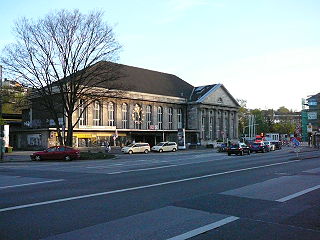
Wuppertal-Barmen station is a station in the city of Wuppertal in the German state of North Rhine-Westphalia on the Elberfeld–Dortmund railway. Its entrance building is protected as a monument. It was Barmen Hauptbahnhof prior to Barmen's incorporation in Wuppertal in 1929. Before the Second World War it was an important stop for express trains and had substantial freight traffic. Its importance declined after the war in favour of Oberbarmen and since the renaming of the Elberfeld station as Wuppertal Hauptbahnhof. The Opernhaus Wuppertal is nearby.

Opernhaus Wuppertal is a German theatre in Wuppertal, North Rhine-Westphalia. It houses mostly performances of operas, but also plays, run by the municipal Wuppertaler Bühnen. The house is also the venue for dance performances by the Tanztheater Wuppertal company created by Pina Bausch.
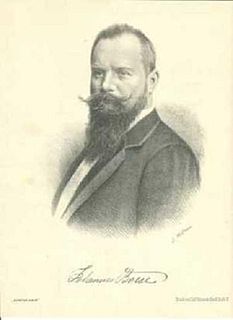
Johannes Boese, also spelled Böse was a German sculptor and art professor.

The Baumwollspinnerei Hammerstein was a cotton mill which had accompanying weaving sheds, located in the area now known as Wuppertal, Germany. It was the largest of its type in Bergisches Land and was owned by the Jung family between 1835 and 1869, when it also included a textile school.

Ernst Hellmut Vits was a German lawyer who headed the rayon manufacturer Vereinigte Glanzstoff-Fabriken (VGF) from 1940 to 1969.
The Kantorei Barmen-Gemarke is a mixed concert choir based in Wuppertal, Germany, focused on sacred music. It was founded by Helmut Kahlhöfer in 1946 and conducted by him for more than four decades. Their repertory includes great classical works as well as premieres of contemporary music. The choir has appeared internationally.

Eisengarn, meaning "iron yarn" in English, is a light-reflecting, strong, waxed-cotton thread. It was invented and manufactured in Germany in the mid-19th century, but is now best known for its use in cloth woven for the tubular-steel chairs designed by Marcel Breuer while he was a teacher at the Bauhaus design school.
Helmut Kahlhöfer was a German church musician and academic teacher. He was the founder and for decades the conductor of the choir Kantorei Barmen-Gemarke.
Christian Heyden was a German architect. He is known for Gothic Revival buildings, especially churches, in Westphalia, Germany.
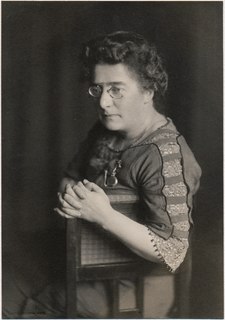
Adeline Rittershaus was a German philologist, a scholar in old Scandinavian literature, and champion for the equality of women. She earned her doctorate in 1898, at the University of Zurich, being one of the first women to do so at that institution, and acquired in 1902, as the first woman, a Venia legendi at the Faculty of Arts of the same university. Her most famous work is a collection of Icelandic folk tales.

The Wuppertal tramway network served Wuppertal, Germany for 114 years until its closure in 1987.

















